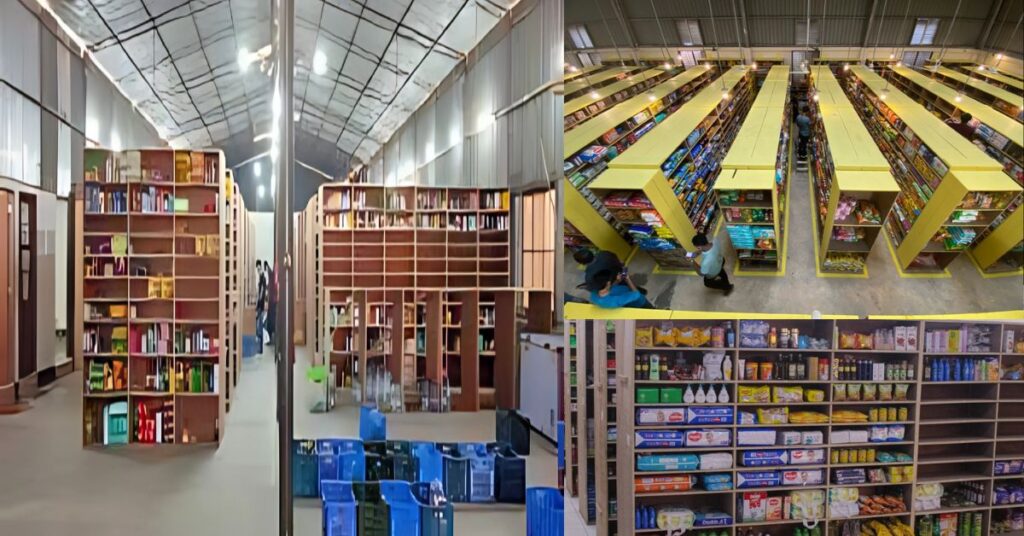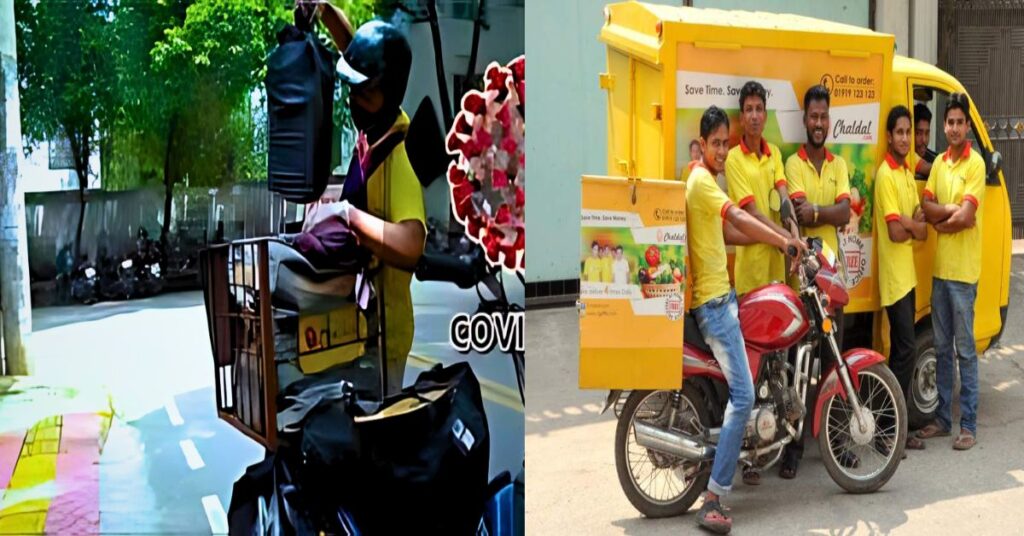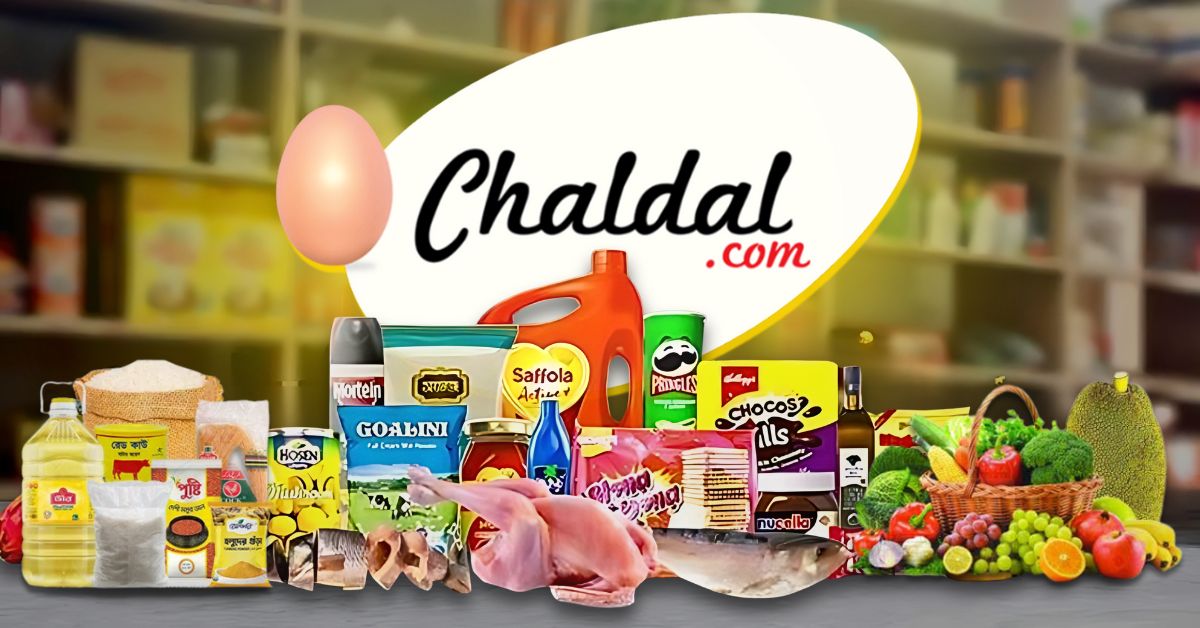1.Introduction
Imagine you need to buy groceries – rice, dal, fresh vegetables, soap, toothpaste, or even a new broom. Traditionally, you’d go to a local market, push through crowds, bargain, and carry heavy bags home. In busy cities like Dhaka, this can be a real hassle with traffic and time constraints.
Chaldal (চালডাল.কম) is here to change that. It’s an online grocery shop for Bangladesh. Think of it as a supermarket that lives on your phone or computer. You can order everything you need for your home, and they deliver it right to your doorstep.“Chaldal” a revolutionary online grocery platform that’s reshaping the way Bangladeshis shop.It has grown significantly, especially fueled by the increased demand for online services during recent years. They’ve expanded beyond Dhaka to cities like Chattogram and Jashore and are continuously looking to reach more areas across Bangladesh.
They’ve attracted significant investment, which they use to expand their operations, improve their technology, and enhance their services. Their goal is to continue being the leading online grocery platform, making daily life easier and more efficient for millions in Bangladesh. It isn’t just an app, it’s a complex well-oiled machine that combines technology, smart logistics, and a deep understanding of local needs to revolutionize how Bangladesh buys groceries. It’s a prime example of how a local company can use innovation to significantly improve daily life and drive economic progress in a developing country.

2.Chaldal’s Founding Story: A Vision Born in Dhaka’s Chaos
Chaldal started its journey in 2013, with a simple idea, to make grocery shopping easier for people in busy cities like Dhaka.At that time, online shopping was still very new, and the idea of buying your groceries online was almost unheard. People were used to the traditional way, going to busy local markets, haggling over prices, and carrying heavy bags back home. This was especially tough in big, crowded cities like Dhaka, where traffic jams and long distances made grocery shopping a time-consuming and often frustrating chore.
2.1.Founders of Chaldal and Their Visions
Chaldal was founded by three smart individuals-Waseem Alim, Zia Ashraf, and Tejas Viswanath. They looked at this common problem – the hassle of grocery shopping – and thought, “What if we could make this easy? What if people could just order what they need from their homes and have it delivered?”
- Waseem Alim came from a background in finance and technology in Silicon Valley (USA), a place known for new tech ideas.
- Zia Ashraf had experience managing big operations in the garment industry in Bangladesh, understanding how to run a large team.
- Tejas Viswanath was a tech expert, skilled in building the “brains” behind online systems.
Together, they realized that if they combined technology with smart logistics (the science of getting things from one place to another efficiently), they could solve this everyday problem for millions.
2.2.The Early Days and a Big Challenge
When they first started Chaldal in September 2013, it was a very small operation. They were delivering just a handful of orders a day, sometimes even just one pack of potato chips! Initially, they tried picking up orders from local grocery stores, like many early online grocery services in other countries.
However, they quickly faced a problem that most local shops in Dhaka were small and didn’t always have everything in stock. This made it hard for Chaldal to guarantee that customers would get exactly what they ordered. They realized this wouldn’t work if they wanted to be reliable and provide a great experience.
2.3.A Bold Decision: Building Their Own System
This challenge led to a very important decision that made Chaldal unique. Instead of relying on existing shops, they decided to build their own network of warehouses. This was a bold move because it was much harder and more expensive, but it allowed them to:
- Control Inventory: They could stock all their products themselves, ensuring they always had what customers wanted.
- Ensure Freshness: By having their own storage, they could better control the quality and freshness of items, especially fruits and vegetables.
- Be More Efficient: With their own system, they could pick and pack orders much faster and organize deliveries more efficiently.
This warehouses which was not open to the public, was quite new, even globally, for grocery delivery at the time.
2.4.From a Small Idea to a Big Player
Chaldal started in a small apartment in Gulshan, Dhaka, with limited money and just a few people. They faced many struggles, from getting enough orders to finding reliable delivery staff. But by focusing strongly on customer experience, make sure people received fresh goods quickly and easily – they slowly built trust.
Their hard work paid off. In 2015, just two years after starting, Chaldal was even recognized by Y Combinator (a famous program for startups) as one of the world’s top 500 startups, putting Bangladesh on the global tech map.
3.How Chaldal Works: Groceries at Your Doorstep Made Easy
Chaldal isn’t just a simple delivery service, it’s a smart system built to get your groceries to you quickly and reliably.
3.1.You Place Your Order
- Open the App or Website: You simply open the Chaldal app on your phone or visit their website on your computer. It’s designed to be user-friendly, like any online shop.
- Browse and Add to Cart: You can look through thousands of items, from fresh fruits and veggies, meat and fish, to rice, oil, spices, cleaning supplies, and even baby products. Just tap or click to add what you need to your “shopping bag.” You can search for specific items too.
- Choose Your Time & Address: Once your cart is full, you tell Chaldal where you live (your address) and pick a convenient time slot for delivery. They often offer very fast delivery, sometimes even within an hour, depending on your area!
- Payment: You can choose to pay when the delivery person arrives (cash on delivery) or pay online using mobile banking (like bKash) or your bank card.
3.2.Chaldal’s Smart System Gets Ready
This is where Chaldal’s special way of working comes in. They don’t just run to a regular shop to pick up your things.
- Mini-Warehouses (Micro-Warehouses): Chaldal has many smaller storage places, like mini-supermarkets, spread out across different neighborhoods in big cities (like Dhaka, Chattogram, Jashore). These are called “micro-warehouses.” This makes delivery super fast.
- Smart Stocking: Inside these mini-warehouses, Chaldal uses clever computer programs (‘technology’ or ‘AI’) to predict what people in that area will buy. They always have popular items in stock and they reduce waste because they don’t over-order things that won’t sell.
- Freshness First: For fresh items like fruits, vegetables, meat, and fish, Chaldal often gets them directly from farms or trusted suppliers. This cuts down on travel time and ensures you get the freshest possible produce. They also have special teams to check the quality before items are stored or delivered.
3.3.Picking, Packing, and Delivering
Once you place your order, the “dance” truly begins:
- Order Appears: Your order immediately shows up on screens at the micro-warehouse closest to you.
- Speedy Picking: Trained Chaldal staff quickly go through the aisles of the warehouse, picking out each item from your order. They use smart tools to find things fast, just like a super-efficient personal shopper.
- Careful Packing: Your items are carefully packed, often in separate bags for fresh produce, dry goods, and cleaning supplies, to keep them safe and hygienic.
- Smart Delivery Routes: Once your order is packed, Chaldal’s computer system figures out the fastest way for the delivery person to get to your home. It considers traffic, other orders in the area, and the shortest routes, in busy Bangladeshi cities.
- On Its Way: A Chaldal delivery rider, often on a motorbike, picks up your packed order. They use a special app that guides them with the optimized route.
- Doorstep Delivery: The delivery person arrives at your doorstep, hands over your groceries, and you can pay.
| Year | Number of Daily Orders | Cities Covered | Employees |
|---|---|---|---|
| 2013 | 30 | 1 (Dhaka) | Few as five |
| 2016 | Not Available | Not Available | Not Available |
| 2020 | Capacity Around 5,000
Received 16,000 |
3(Dhaka, Narayanganj, and Cox’s Bazar) | Over 1,700 |
| 2024 | 12,000 | 6+ (2020 but temporarily closed warehouses and not available info of 2024) | 3,000 |
Table: Number of Daily Orders Over Time
4.Unique Features & Innovations: What Makes Chaldal Special
Chaldal isn’t just about taking an order and delivering it. They’ve built some really clever and unique things into their system to make it work super smoothly, especially in a challenging environment like Bangladesh.

4.1.The “Micro-Warehouse” Network
Instead of having one giant warehouse far away, Chaldal has many smaller storage hubs, like mini-supermarkets, spread out in different neighborhoods across the city. Most grocery delivery services would use a big central warehouse. Chaldal realized that in traffic-heavy cities like Dhaka, being close to the customer is everything. These smaller “micro-warehouses” mean:
- Fast Delivery: Chaldal offers 1-hour grocery delivery service in Dhaka, subject to the availability of delivery slots. Order can be place 7:30 am to 11:00 pm everyday. Chaldal also provides delivery within the specified preferred time slots selected by the user. This is incredible in a city where moving a few kilometers can take ages.
- Fresher Products: Since items travel shorter distances from the warehouse to your home, fresh produce stays much fresher.
- Hyperlocal Efficiency: They know what people in your specific area typically buy, allowing them to stock just the right things in that nearby micro-warehouse.
4.2.Direct Sourcing & “Chaldal Vegetable Network”
Chaldal doesn’t just buy from big wholesalers. They’ve built direct relationships with farmers, especially for fresh fruits and vegetables. They even have a special system called the “Chaldal Vegetable Network (CDVN).” It’s unique because,
- Guaranteed Freshness: By cutting out many middlemen, they ensure that vegetables and fruits are picked, transported, and delivered to their warehouses very quickly, often within hours of harvest. This means you get really fresh items.
- Better Prices for Farmers: This direct connection can often mean farmers get a fairer price for their produce, which is a big deal for rural economies.
- Quality Control: They can enforce stricter quality checks right at the source.
4.3.Advanced Technology & Algorithms
Chaldal uses very sophisticated computer programs and data analysis for almost everything, from predicting what you’ll buy to figuring out the best delivery routes. It’s unique because,
- Demand Forecasting: Their systems can predict what items will be popular on certain days, at certain times, or during certain seasons. This helps them stock their warehouses perfectly, so they rarely run out of what you need.
- Route Optimization: Chaldal’s system automatically plans the most efficient routes for their riders, combining multiple orders to save time and fuel. This is crucial for their “1-hour delivery” promise.
- Smart Inventory Management: Their tech tracks every single item in their many warehouses, ensuring efficient storage and quick retrieval for packing.
4.4.Owned Logistics
Some services that might use outside delivery companies, Chaldal manages almost all of its own logistics – from their warehouses to their delivery riders.
- Full Control: This allows them to maintain very high standards for delivery speed, accuracy, and customer service. If there’s an issue, they can fix it quickly because they own the whole process.
- Reliability: It makes their service much more dependable, which is a huge comfort for customers who rely on them for daily necessities.
- Job Creation: This in-house model also means they create many jobs for their delivery force, offering stable employment.
4.5.“Chaldal Credit” and Easy Refunds
If you have an issue with an item, Chaldal makes refunds easy. In a market where trust in online services is still growing, a straightforward refund policy builds immense confidence. It shows they stand by their product quality and care about customer satisfaction. They have a system called “Chaldal Credit” where refunds can be quickly added to your Chaldal account, which you can then use for your next purchases.
5.Chaldal During COVID-19 and After COVID-19
The COVID-19 pandemic was a huge moment for online grocery shopping, and Chaldal was right at the center of it in Bangladesh.

5.1.Chaldal During COVID-19: A Lifeline in Lockdown
When the COVID-19 pandemic hit Bangladesh in early 2020, everything changed overnight. Lockdowns were put in place, and people were told to stay home to stay safe. Going to crowded markets became risky, and many were afraid to even step outside. This created a massive problem like how would people get their daily necessities like food and hygiene products? This is where Chaldal truly became a lifeline.
- Explosion in Demand: Suddenly, everyone needed online grocery delivery. Chaldal saw their orders go through the roof, their daily order volume increased four to five times, and the size of each order also doubled. People who had never shopped online before quickly realized it was the safest way to get groceries.
- Massive Pressure, Quick Response: This huge jump in demand put huge pressure on Chaldal. They had to quickly adapt like, hiring employee (they rapidly hired hundreds of new delivery staff and warehouse workers to handle the increased volume), more motorcycles & Warehouses (To support the new staff and faster deliveries, they invested in more motorcycles and even set up temporary (makeshift) warehouses to expand their capacity),safety first (chaldal immediately put in place strict health and safety measures. This included, daily temperature checks for all staff, mandatory masks and hand sanitizers for everyone, frequent cleaning and disinfecting of warehouses and delivery vehicles, encouraging “contactless delivery” where customers paid online and orders were left at their doorstep to avoid direct contact), partnerships for stability (to ensure essential items were always available and prices remained fair, Chaldal partnered with government bodies like the Trading Corporation of Bangladesh (TCB) to sell basic products at discounted rates. They even helped stabilize onion prices during a previous surge.)
- “Chaldal Daily”: They even launched “Chaldal Daily” which was a simplified service focused on basic essentials, designed for quick, prepaid, and minimal contact delivery during the crisis.
During this time, Chaldal was recognized for its dedication, even being named the “best e-commerce company of the year” at Digital World 2020 for its service during the crisis. They truly rose to the occasion, becoming an essential service for urban residents.
Read More: Automated Speeding Case System Launched on Dhaka Elevated Expressway
5.2.Chaldal After COVID-19: Continued Growth and Evolution
While the most intense lockdown periods are over, COVID-19 permanently changed consumer habits. Many people who tried online grocery shopping out of necessity during the pandemic realized its immense convenience and stuck with it.
- Sustained Growth: Even after the peak of the pandemic, Chaldal continued to see strong growth. People became “habituated” to online shopping. While the average spending per family might have slightly dipped as people started going out more, the overall number of customers using Chaldal continued to increase.
- Aggressive Expansion: Seeing this continued demand, Chaldal accelerated its expansion plans outside of Dhaka. They moved into new cities like Khulna, Sylhet, Jashore, and Narayanganj. Their goal was to significantly increase their number of micro-warehouses and presence across Bangladesh. They aimed for 15-20 districts by 2022 and planned to have 100 warehouses nationwide.
- Investment and Innovation: With continued growth, Chaldal attracted more investment, like a significant $10 million Series C funding round in 2021. This money helps them, expand further (open more warehouses and reach more customers in new areas), improve technology (continuously enhance their apps, delivery systems, and prediction algorithms to be even more efficient), diversify services(they continued to develop related services like GoGo Bangla (their logistics arm for other businesses) and the Chaldal Vegetable Network (for direct sourcing from farmers), further strengthening their overall supply chain. They even acquired an online pharmacy, BanglaMeds, to offer more essential services.)
- Building Long-Term Trust: The pandemic helped Chaldal build massive trust with customers. They proved they could deliver even under extreme pressure. Their focus now is to maintain that trust by consistently offering quality products, reliable delivery, and excellent customer service.
COVID-19 was a trial by fire for Chaldal. They not only survived but proving their resilience and capability. The pandemic acted as a huge catalyst, pushing online grocery shopping in Bangladesh and Chaldal’s position as a key player in the country’s digital transformation.
| Time Period | Average Orders per Day |
|---|---|
| Before COVID-19 (2019) | 2,000 orders/day |
| During COVID-19 Lockdown (2020) | 10,000+ orders/day |
| After COVID-19 (2024) | 15,000–20,000 orders/day |
Table: Chaldal’s Orders per Day: Before, During, and After COVID-19
6.Economic & Social Impact of Chaldal
Chaldal is more than just an online grocery shop, it has also made a positive impact on the economy and society of Bangladesh. By using smart technology and creating jobs, Chaldal has helped improve the lives of many people, both directly and indirectly.
6.1.Economic Impact: Boosting the Economy
•Job Creation:
- Direct Jobs: Chaldal directly employs thousands of people. Think about all the delivery riders on motorbikes, the staff working in their many warehouses (picking and packing orders), customer service representatives, tech engineers, and administrative staff. Many of these are entry-level jobs that provide income and opportunities for people, including those who might not have had formal employment before.
- Indirect Jobs: Their growth also supports jobs in other related businesses, like companies that supply packaging materials, fuel stations for their delivery fleet, and maintenance services for their vehicles.
•Supporting Farmers and Producers:
By sourcing fresh produce directly from farmers through initiatives like the Chaldal Vegetable Network, they create a more direct connection between rural farmers and urban consumers. This can lead to, better income for farmers (farmers might get fairer prices for their produce because there are fewer middlemen taking a cut), more stable demand (Farmers have a more consistent market for their goods, which helps them plan their harvests better and reduces uncertainty), boosting local brands (Chaldal’s platform provides a huge online storefront for thousands of local brands and products to reach a wider customer base, helping these businesses grow)
•Modernizing the Supply Chain:
- Efficiency: Chaldal’s advanced logistics and micro-warehouse model act as a blueprint for how to make supply chains more efficient in Bangladesh. This can inspire other businesses to adopt similar smart practices.
- Reducing Waste: By having a quicker and more organized way of getting fresh food from farms to homes, Chaldal helps reduce food waste, which is a big economic problem globally.
•Contribution to E-commerce Growth:
Chaldal is a leading example of a successful e-commerce company in Bangladesh. Its success encourages investment in other tech startups and helps build the overall digital economy of the country. This brings in foreign investment and shows that online businesses can established in Bangladesh.
6.2.Social Impact: Changing Lives for the Better
•Unprecedented Convenience for Consumers:
- Time-Saving: This is perhaps the biggest social impact for busy urban dwellers. Instead of spending hours in traffic and crowded markets, people can now use that time for family, work, education, or simply relaxation.
- Access for All: Chaldal provides easy access to groceries for a wide range of people, including, who have limited time after work, who can manage household chores more efficiently, who might find it difficult to go out for shopping, making it easier to manage household needs while caring for kids.
- Safety and Hygiene: Especially highlighted during COVID-19, Chaldal offers a safer way to shop, reducing exposure to crowded public places and ensuring more hygienic handling of products through their controlled warehouses.
•Empowering Women:
- Many of the new jobs created, particularly in customer service and sorting within warehouses, can be suitable for women, offering them new employment opportunities.
- Additionally, by making grocery shopping less time-consuming, Chaldal indirectly frees up time for women in households, potentially allowing them to pursue educational, professional, or personal interests.
- Through its investment in “Cookups” (a platform for home-cooked food), Chaldal also indirectly supports female home-based entrepreneurs.
•Improved Lifestyles:
- By reducing daily chores, Chaldal contributes to a higher quality of life for many urban families. It lowers stress related to shopping and allows for better time management.
- Access to a wider variety of fresh and quality products means better nutrition and healthier living choices for consumers.
•Bridging the Urban-Rural Divide:
Through its direct sourcing from farmers, Chaldal helps connect rural producers with urban markets, potentially bringing more modern practices and fair opportunities to the agricultural sector.
| Job Type | Number of Workers (Est.) |
|---|---|
| Delivery Persons | 800+ |
| Warehouse Workers | 300+ |
| Customer Support | 100+ |
| Tech & Management | 200+ |
| Total | 1,400+ |
7.Competitors & Market Position: How Chaldal Stays Ahead
Chaldal is the most popular online grocery shop in Bangladesh, but it’s not the only one. In recent years, several other companies have also entered the online grocery market. These include, Meena Click, Shwapno Online, Daraz Mart, and Khaas Food, among others. Each of them offers grocery delivery services, but Chaldal has managed to stay ahead of the competition.
7.1.Chaldal’s Strong Position
- First Mover Advantage: Chaldal was one of the very first to truly succeed in online grocery delivery in Bangladesh. This means they built brand recognition and customer trust early on.
- Strong Infrastructure: Their network of micro-warehouses and advanced technology (for things like predicting demand and optimizing delivery routes) is a huge advantage. It’s tough for new players to copy this quickly.
- Customer Loyalty: Many customers are very happy with Chaldal’s speed and reliability, especially after their strong performance during the pandemic. They have a high number of returning customers.
- Experience & Data: Having been around since 2013, Chaldal has a lot of data on customer preferences, market trends, and logistical challenges, which helps them make smart decisions and keep improving.
7.2.Who are the Competitors?
The competitors generally fall into a few categories:
•Online Extensions of Traditional Supermarkets:
- Shwapno: This is one of the largest physical supermarket chains in Bangladesh. They have a strong brand name and existing supplier relationships. Their online platform (Shwapno.com) allows customers to order groceries for home delivery, leveraging their physical store network.
- Meena Click: Similar to Shwapno, Meena Click is the online arm of the popular Meena Bazar supermarket chain. They aim to provide the convenience of online shopping with the trusted quality of their established brand.
•Large E-commerce Platforms with Grocery Sections:
- Daraz (Daraz Mart): Daraz is the biggest general e-commerce platform in Bangladesh (think Amazon of Bangladesh). They have a dedicated “Daraz Mart” section for groceries. Their strength is their huge existing customer base, frequent discounts, and wide reach across the country. However, their primary focus isn’t just groceries, which can sometimes affect specialized grocery services like freshness for perishable items compared to dedicated players.
- Foodpanda: While famous for restaurant food delivery, Foodpanda has also significantly expanded into grocery delivery through “PandaMart” or partnerships with local stores. They have a vast network of riders and a strong presence in many cities.
•Other Dedicated Online Grocery Startups:
There are always newer, smaller players emerging, sometimes focusing on specific niches (like organic products, or specific areas). Examples might include services like Othoba.com (which is a general e-commerce platform that also offers groceries), Sheba Groceries, Jogaan, and others. They might try to compete on price, unique product offerings, or serving very specific local areas.
| Company | Key Features |
|---|---|
| Meena Click | Run by Meena Bazar; delivers branded goods |
| Shwapno Online | Popular retail chain offering online orders |
| Daraz Mart | Offers groceries via the Daraz app |
| Khaas Food | Focuses on organic and chemical-free products |
Chaldal’s Market Position:
Despite the competition, Chaldal generally holds the leading position in the dedicated online grocery delivery space in Bangladesh.
- They are known for their speed and reliability, especially in major cities, thanks to their micro-warehouse model.
- They often have a wider range of specialized grocery products compared to general e-commerce platforms.
- Their focus is purely on groceries, which allows them to optimize their operations for things like fresh produce handling and efficient temperature control.
7.3.Challenges and How Chaldal Stands Out
- Price Sensitivity: Bangladeshi customers are often very price-sensitive. Chaldal tries to keep prices competitive by sourcing directly and being very efficient, but larger players like Daraz might offer aggressive discounts.
- Trust in Online Freshness: Some customers still prefer to pick their own fresh produce. Chaldal addresses this by having strong quality control at their warehouses and offering easy return policies.
- Reaching Beyond Cities: While Chaldal is expanding, Bangladesh is a large country. Competitors with a more widespread existing network (like Daraz or Foodpanda) might have an advantage in reaching smaller towns.
8.Conclusion
Chaldal has truly changed the way people in Bangladesh buy their groceries. What started as a small startup with a simple idea has now become a trusted household name, helping thousands of families shop with comfort, speed, and confidence. From delivering fresh vegetables within one hour to supporting local farmers and creating jobs, Chaldal has shown how technology can make life better.
What started as a daring idea by three founders in 2013 has grown into a vital service, reshaping how millions of Bangladeshis manage their daily lives. Chaldal’s success isn’t just about delivering food, it’s a testament to smart thinking. Their unique network of micro-warehouses, their direct connections with farmers, and their clever use of technology have set a new standard for speed, freshness, and reliability in Bangladesh. They’ve tackled tough challenges like traffic and logistics head-on, proving that even in a bustling city, a seamless shopping experience is possible.
The COVID-19 pandemic highlighted Chaldal’s crucial role, transforming it from a convenience to a necessity for many families. They adapted quickly, ensuring essential goods reached homes safely when traditional markets were risky. This period solidified their position, not just as a business, but as a reliable partner during times of crisis.
Reference
Wikipedia
Chaldal
Builtworlds
Future Startup
The Business Standard
Payments and Commerce Market Intelligence
Inspire food Business
International Finance Corporation
PromptLoop
Dribbble
Share via:



















